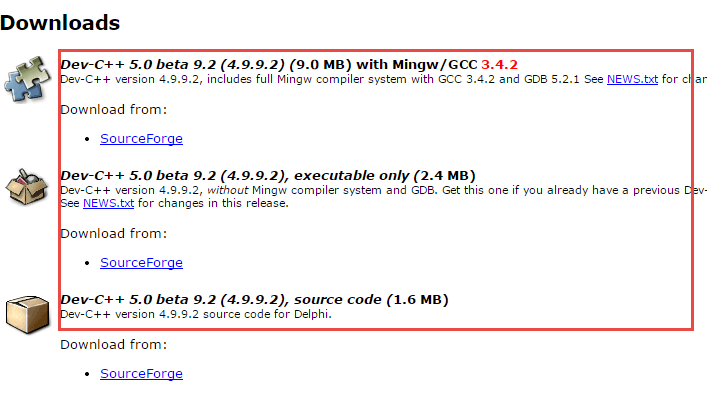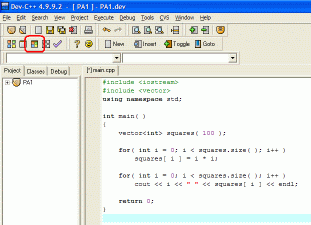- Dev C++ If Statement Examples Pdf
- Dev C++ If Statement Examples Free
- If Statements In C++ Pdf
- Conditional Statements C++ Examples
Sometimes when creating a C++ program, you run into a situation in which you want to compare one thing to a number of other things. Let's say, for example, that you took a character from the user and wanted to compare this to a number of characters to perform different actions. For now, let's just say that you have three commands which operate from the keys: 'h', 'e', and 'q'.
We can use an if-statement to check equality to 'h', 'e', and 'q' - remember that we use single quotes because we're dealing with chars, not strings. So let's just write the code in the way we're used to (and let's wrap a while loop around it so it keeps getting a character and acting upon what it was, because that makes our program slightly better and easier to test), using if-statements, like the following:

Dev C++ If Statement Examples Pdf
This program should be something you're comfortable with creating by this point, however your programmer instincts should also be kicking in and telling you that you shouldn't be repeating so much code here. One of the core principles of object orientated programming is DRY: Don't Repeat YTraktor scratch pro 2 midi controller. ourself. In this program we're having to repeat a lot of code for the 'else if's including using ch every time we're doing a comparison.
Dev C++ If Statement Examples Free
Dec 15, 2014 World's Most Famous Hacker Kevin Mitnick & KnowBe4's Stu Sjouwerman Opening Keynote - Duration: 36:30. Cyber Investing Summit Recommended for you. If else statements in C is also used to control the program flow based on some condition, only the difference is: it's used to execute some statement code block if the expression is evaluated to true, otherwise executes else statement code block. An if statement can be followed by an optional else if.else statement, which is very usefull to test various conditions using single if.else if statement. When using if, else if, else statements there are few points to keep in mind. Jun 07, 2014 c if else programs example c if else shorthand c if else one line c if else statement shorthand c if else multiple conditions c if else question mark c if else statements c. The if statement allows you to control if a program enters a section of code or not based on whether a given condition is true or false. One of the important functions of the if statement is that it allows the program to select an action based upon the user's input. For example, by using an if statement to check. In this example, if.else statement is used to check whether a number entered by the user is even or odd. C if, if.else and Nested if.else Integers which are perfectly divisible by 2 are called even numbers. And those integers which are not perfectly divisible by 2 are not known as odd.
Nov 06, 2019 14. Auto Tune app- Voice changer with sound effects by Best Apps Storehouse Android This app allows you to record your voice or opening music and allows you to edit it with audio effects. In this app, you can record your voice and its built in special effects will change your voice. Jan 21, 2019 You could be a music amateur trying out composing on your own. Or you could be an advanced musician looking out for ways to edit your tack. If you are searching an auto tune app for iPhone, Vio is the perfect app for you! This is the best auto tuning app to rectify your vocals and voice! Best auto tune voice app. Jul 24, 2018 List of Top Auto Tune Apps 1- AutoRap by Smule. 3- Speaker Studio. 4- Star Maker Free to Sing. 5- Voloco Auto Voice Tune + Harmony. 6- Spongify by Smule. 8- Glee Karaoke. 9- The Voice Sing and Connect. 10- Perfect Vocal Free.

The solution to this 'problem' is what this tutorial is all about: switch statements. These are essentially just a really nice way to compare one expression to a bunch of different things. They are started via the switch keyword, and from there comparisons are made using a case: syntax. It isn't easily described in words, so take a look at the syntax below:
If Statements In C++ Pdf
The different cases essentially act as many if/else-ifs in a chain, and an 'else' type clause can be specified by using default:
Conditional Statements C++ Examples
This type of functionality should be reasonably easy to understand with if-statements securely under your belt, and so if you're feeling brave - try porting the basic program we created at the start of this tutorial to use if-statements. If you're not quite that brave, the cleaner and neater switch version of the code is below: